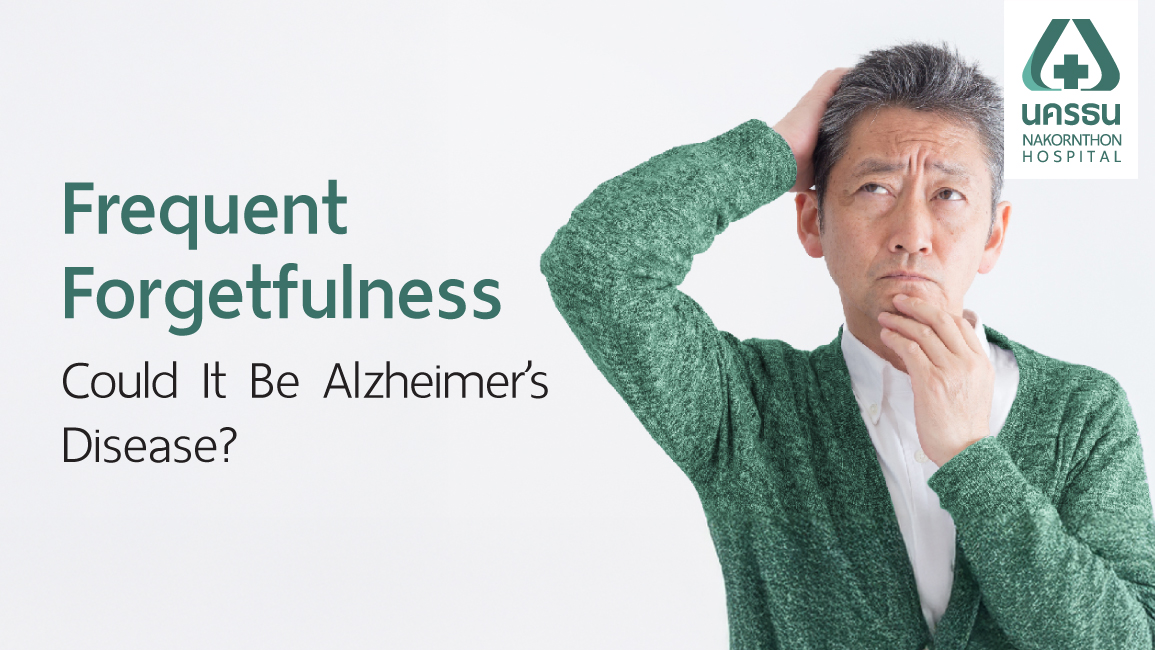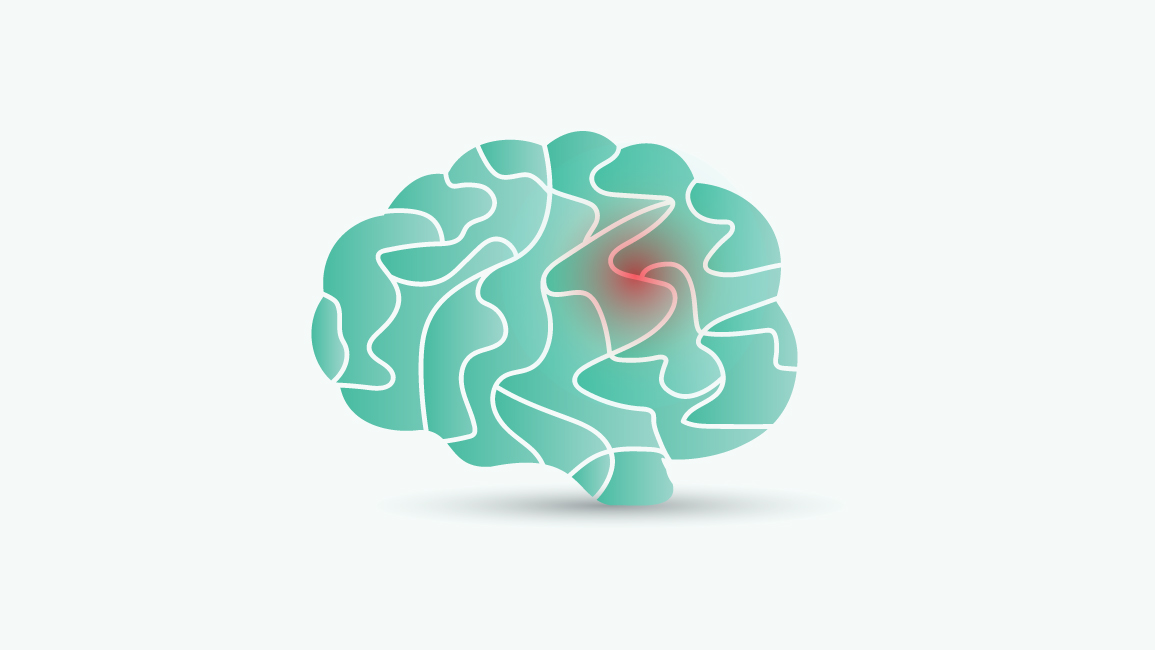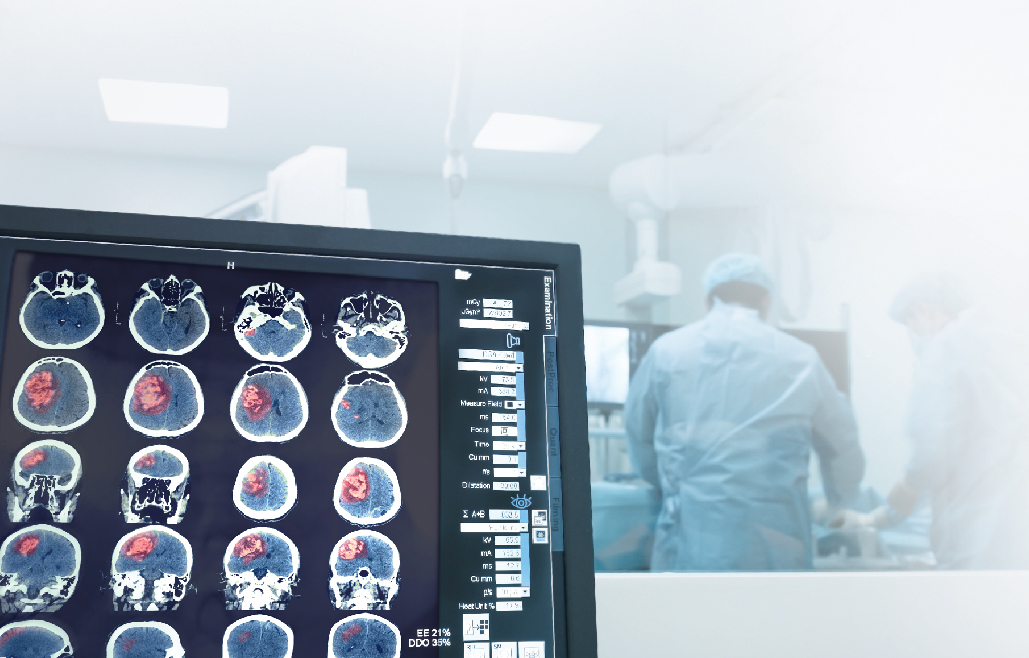Alzheimer's Disease: Don't Miss These Critical Warning Signs
Center : Neurology Center
Article by : Dr. Roongthip Chaiteerakij

If the elderly person in your home shows changes in behavior and mood, experiences forgetfulness, confusion about time and place, inability to recognize or learn new things, and uses language abnormally, these behaviors may be important warning signs to watch for Alzheimer's disease. The key differences between those who have age-related forgetfulness and those who are beginning to enter the risk group for Alzheimer's disease require careful attention and close evaluation.
Table of Contents
- What is Alzheimer's Disease?
- What causes Alzheimer's Disease?
- What Are the Risk Factors for Alzheimer’s Disease?
- What Are the Symptoms of Alzheimer’s Disease?
- How Is Alzheimer's Disease Diagnosed?
- How Is Alzheimer’s Disease Treated?
- Alzheimer’s: Early Detection Enables Timely Treatment and Prevention at Nakornthon Hospital
- Free Online Consultation with a Specialist
What is Alzheimer's Disease?


Alzheimer's disease is a type of brain degeneration that causes various brain functions to gradually decline over time. The main cause comes from the accumulation of two types of abnormal proteins in brain tissue: beta-amyloid and tau proteins. These proteins destroy brain cells, causing brain cells to die and resulting in gradual shrinkage of brain tissue volume. When brain cells are destroyed to a certain level, the brain gradually loses its ability to function, causing problems with thinking, memory, behavior, and daily living. Alzheimer's disease is also the most common type of dementia, accounting for approximately 60-80% of all dementia patients.
What causes Alzheimer's Disease?
Alzheimer's disease is primarily caused by the accumulation of two types of abnormal proteins in the patient's brain tissue: amyloid protein and tau protein. When these proteins begin to accumulate increasingly, they damage and eventually kill brain cells, causing brain tissue volume to decrease. When enough brain cells are destroyed, the brain gradually loses its ability to function slowly, ultimately leading to dementia.
Alzheimer's disease progresses slowly and gradually. The most important initial symptom of Alzheimer's patients is short-term memory loss, which is similar to natural memory decline in elderly people. However, over time, 80-90% of patients will also develop behavioral or psychiatric symptoms. These behavioral symptoms make caring for patients much more difficult, especially those with aggressive symptoms.
How many stages does Alzheimer's have? Alzheimer's disease can be roughly divided into three stages:
- Early Stage: Patients experience memory decline that they can feel themselves, tend to ask repetitive questions, repeat the same stories, become confused about directions, start to feel stressed, become easily upset, and depressed.
- Middle Stage: Patients show more obvious Alzheimer's symptoms with worsening memory, wandering away from home without purpose, and significant behavioral changes. For example, someone who was once calm may become irritable, agitated, aggressive, or use crude language.
- Late Stage: This is considered the severe stage. Patients respond less to their surroundings, their health deteriorates similar to bedridden patients, they eat less, move less or not at all, cannot help themselves, experience urinary or fecal incontinence due to inability to control, and lose the ability to perform daily activities. They must depend on others for simple tasks like feeding and bathing. Additionally, weakened immunity causes complications and infections that can lead to death.
What Are the Risk Factors for Alzheimer’s Disease?


Besides the main Alzheimer's causes mentioned above, there are several risk factors that increase the likelihood of developing the disease, including:
- Age: The most important risk factor. Most patients are typically 60 years or older, and the risk increases with age.
- Genetics: Although most Alzheimer's cases are not directly caused by genetic inheritance, having a family history, especially direct relatives with this disease, increases the risk. Certain genes are associated with increased disease risk.
- Chronic Conditions: Certain chronic diseases that affect brain vascular health, such as diabetes, high blood pressure, high blood cholesterol, heart and vascular diseases, and obesity.
- Lifestyle and Behavior: Such as lack of exercise, smoking, excessive alcohol consumption, insufficient sleep and rest, lack of brain stimulation and social interaction, and depression.
- Head Injuries and Brain Conditions: Previous severe head injuries or brain tumors may increase the risk.
- Cerebrovascular Disease: Conditions affecting blood vessels in the brain, including arteriovenous malformations, can compromise brain health and potentially contribute to cognitive decline.
What Are the Symptoms of Alzheimer’s Disease?
Alzheimer's disease symptoms gradually worsen over time. The symptoms that indicate Alzheimer's include:
- Language comprehension decline: Using incorrect language, inability to name objects correctly, may stop speaking mid-sentence without knowing what to say next, and may speak less frequently.
- Memory loss symptoms: Such as forgetting belongings, missing appointments, inability to remember recent events or conversations, forgetting new occurrences, forgetting important dates or past significant events.
- Confusion about time or place: Confusion about seasons, inability to find their way home, and they may forget where they are currently and how they got there.
- Inability to recognize familiar people: Cannot remember friends or family members they once knew, thinking they are strangers.
- Unable to perform previously familiar activities: Such as forgetting how to change TV channels.
- Problems with counting or making change: Difficulty using phones or reading clocks.
- Impaired perception or learning new things: Not knowing what objects are used for, or an inability to distinguish tastes or smells.
- Impaired management and decision-making: Afraid to make decisions or frequently making wrong decisions.
- Impaired daily routine activities: Such as bathing, dressing, unable to go anywhere alone.
- Problematic behaviors: Such as leaving the house at night.
- Personality changes: Such as depression, lethargy, easy anger without clear cause, aggressive behavior, hallucinations, and paranoia.

How Is Alzheimer's Disease Diagnosed?


Doctors will take a medical history from patients, relatives, or caregivers who can provide important information about daily living abilities and behaviors that indicate brain function decline. Then brain testing begins to measure functional performance and assess cognitive impairment for disease diagnosis, such as administering single-page paper tests with questions about general knowledge, brain skills, and arithmetic, combined with physical examination and appropriate laboratory tests to ensure correct differential diagnosis of whether the patient has Alzheimer's disease or dementia and what causes it, such as cerebral vascular stenosis.
Laboratory tests include various blood tests, brain imaging with Computed Tomography (CT) or Magnetic Resonance Imaging (MRI).
How Is Alzheimer’s Disease Treated?
Alzheimer's treatment depends mainly on the underlying cause. For patients with dementia caused by nerve cell degeneration or Alzheimer's disease, there is currently no cure. Treatment approaches focus on slowing disease progression:
- Medication therapy to improve patient symptoms and slow disease progression, which is usually effective for early-stage patients, combined with medication for mood and behavioral abnormalities in patients with severe symptoms.
- Medical technology treatments without surgery or medication:
- TDCS (Transcranial Direct Current Stimulation): Mild electrical brain stimulation to enhance memory and brain capacity, particularly helpful for early and moderate-stage Alzheimer's patients with less severe symptoms.
- TMS (Transcranial Magnetic Stimulation): Electromagnetic wave technology that can penetrate 1-3 centimeters deep into organs, inducing changes in system function and promoting neurotransmitter release necessary for repairing and creating neural circuits in the brains of patients with memory decline from Alzheimer's disease.
- Behavioral modification and proper health care can reduce risk and slow disease onset:
- Regular brain training: Playing memory games, chess, or brain exercise puzzles
- Reading books and learning new things: Such as second languages, music, or new skills
- Avoiding prolonged inactivity without engaging in activities
- Emphasize eating green leafy vegetables, berries, whole grains, fish, beans, and olive oil
- Reduce foods high in trans fats, saturated fats, sugar, and salt
- Regular exercise: At least 150 minutes per week of activities like brisk walking, swimming, cycling, or aerobic dancing to stimulate blood circulation to the brain and reduce related disease risks
- Adequate sleep, stress reduction, and mental health care
- Control chronic conditions: Such as diabetes, high blood pressure, high blood cholesterol
- Avoid risky behaviors: No smoking, avoid secondhand smoke, limit alcohol consumption to moderate levels
Alzheimer’s: Early Detection Enables Timely Treatment and Prevention at Nakornthon Hospital
No one wants to develop Alzheimer's disease, so it's important to take care of yourself through simple methods: regularly exercise your brain by reading books consistently, maintain good mental health, and for those aged 60 and above, or elderly family members showing any of these warning signs, early screening and diagnosis for Alzheimer's disease should be initiated. This is because if the disease is detected early and treated promptly, Alzheimer's can be prevented through consultation with specialized physicians.
The Neurology Center at Nakornthon Hospital is fully equipped to examine and treat Alzheimer's patients while providing expert consultation to caregivers. Our specialized physicians conduct comprehensive brain assessments using internationally standardized evaluation tools, offering appropriate recommendations and developing treatment plans utilizing innovative TDCS and TMS technologies as alternative treatment options for patients experiencing memory decline.
For more information, please contact:
- - Website : https://en.nakornthon.com
- - Facebook : Nakornthon Hospital - International Patient
- - Line : @nakornthoninter
- - Tel: 02-450-9999 (Available 24 hours)
Free Online Consultation
Article of Neurology Center







